Top 20 Skills Assessment Tools to Make Hiring Smarter
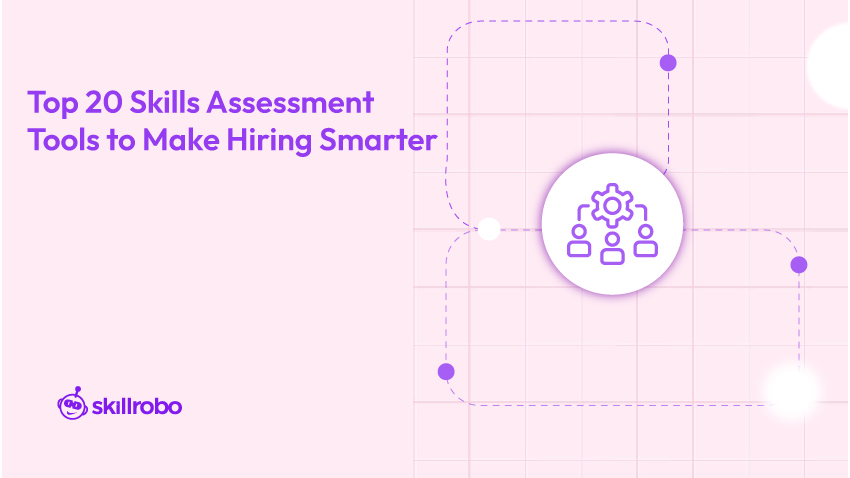
Key Takeaways
- Skills assessment tools provide objective evaluations to help recruiters hire based on real capabilities, not assumptions.
- These tools automate hiring workflows, reducing time-to-hire and improving recruitment accuracy.
- From coding tests to cognitive evaluations, skills testing software offers flexible formats for all job roles.
- Using tools like Skillrobo helps HR teams make informed, bias-free decisions at scale.
Why Businesses Need Skills Assessment Tools
Hiring today requires more than reviewing a résumé or relying on gut instinct. With the demand for high-performing, adaptable teams at an all-time high, businesses must turn to smarter methods to evaluate real-world capabilities. That’s where skills assessment tools come into play. These platforms allow organizations to simulate job-specific scenarios, giving recruiters a clear picture of how candidates perform in practical situations, not just how they present themselves. A well-structured online skills assessment significantly reduces mis-hires and ensures the right candidates advance through the hiring funnel.
By validating job-specific competencies early in the process, companies save time, reduce hiring costs, and improve retention. In this blog, we explore the role of skills assessment software, key features to look for, and 20 top tools reshaping the hiring landscape.
What Are Skills Assessment Tools?
Skills assessment tools or recruitment assessment tools are software-based solutions that allow hiring teams to evaluate candidates based on real-world tasks and role-specific competencies. Unlike traditional methods that rely on academic background or past job titles, these tools focus on what candidates can do right now.
Modern skill assessment platforms use structured tests, simulations, and scenario-based exercises to evaluate a wide range of skills. For instance, a software skills assessment might require candidates to debug code or complete a logic-based exercise, while a sales role might test objection-handling or negotiation strategies through role-play simulations.
Many companies now build custom assessments that reflect the actual job environment. In fact, creating a role-specific test has become easier with platforms that guide users through how to design a pre-employment skill assessment test aligned with hiring objectives.
These tools also offer deeper value beyond hiring. Organizations that incorporate structured assessments into talent development strategies often report higher productivity and lower turnover, since the right people are matched to the right roles. This connection between targeted assessments and workforce stability is evident in how skill assessments drive employee retention rates.
By integrating these intelligent evaluations into the hiring process, HR assessment tools enable more inclusive, objective, and data-backed decision-making.
Why Use Skills Assessment Software in Hiring?
Hiring today is both high-stakes and high-speed, and that’s why more recruiters and HR teams are relying on skills assessment software to bring clarity, speed, and fairness to the process. Whether you’re hiring at scale or filling niche roles, these tools enable smarter, more evidence-based decisions.
Here’s why recruiters increasingly turn to skills testing software:
1. Better Hiring Accuracy
These tools eliminate the guesswork by delivering measurable data on how well a candidate can perform specific tasks. Instead of relying on self-reported experience or polished résumés, hiring managers get actionable insights into real capabilities. Using skills assessment tests aligned to job functions ensures candidates are objectively evaluated against role-specific benchmarks.
2. Faster Screening and Shortlisting
Manually reviewing dozens (or hundreds) of applications is time-consuming and often inefficient. Skills assessment software streamlines this by automatically ranking candidates based on performance, enabling teams to focus only on top scorers. This not only shortens the hiring cycle but also reduces the burden on recruiters during high-volume recruitment phases.
3. Reduced Hiring Bias
Automated evaluations ensure that every candidate is assessed using the same criteria, removing unconscious bias from the process. By focusing purely on skill demonstration rather than educational background, gender, or communication style, skills testing software supports fair and inclusive hiring. As outlined in Skillrobo’s insight into reducing bias through pre-employment screening, this approach levels the playing field for all applicants.
4. Higher Employee Retention
When candidates are hired based on true role readiness, they tend to be more confident, more productive, and more likely to stay. Online skills assessments help match the right person to the right job, which minimizes the risk of early attrition and builds stronger teams from the start.
5. Scalable Across Roles
From marketing to IT, customer service to operations, online skills assessments can be customized to suit any role or department. Whether you need a behavioral screening for support staff or a technical simulation for developers, modern skills assessment software adapts easily to your hiring goals.
Key Components of an Effective Skills Tool
To deliver real hiring value, a skills assessment tool must go beyond basic testing. It should offer flexibility, automation, and data-driven insights, all while maintaining a secure and seamless experience for both recruiters and candidates. Here are the must-have features that define a truly effective solution:
1. Role-Specific Test Libraries
A top-tier skills tool should offer a wide variety of assessments tailored to different job roles, technical and non-technical alike. Whether you’re hiring a software engineer or a customer support executive, the platform should allow you to either select from a pre-built library or customize your own assessments based on job-specific needs. Tools that support customized employee skill assessment strategies ensure better alignment with organizational goals.
2. Automated Scoring
Speed and consistency are critical in high-volume hiring. Automated scoring mechanisms evaluate tests in real time, removing manual errors and providing immediate feedback. This helps hiring managers quickly shortlist top performers with confidence.
3. Data Analytics
The best skill assessment platforms offer rich reporting features that go beyond pass/fail outcomes. They highlight candidate strengths and weaknesses, compare performance across cohorts, and track benchmarks for better decision-making. These analytics help recruiters understand not just who performed well, but why.
4. Anti-Cheating Mechanisms
To ensure test integrity, online skills assessment tools should include robust anti-cheating features such as webcam proctoring, IP tracking, question randomization, and browser restriction. These measures protect the credibility of your evaluation process.
5. ATS Integration
A powerful skills testing software solution should integrate easily with your existing Applicant Tracking System (ATS), enabling a smooth hiring workflow. With end-to-end visibility from test invite to offer letter, ATS integration eliminates data silos and manual duplication.
By incorporating these components, a skills assessment software not only enhances accuracy and objectivity but also improves the overall candidate and recruiter experience.
How to Use Skills Assessment Software in Your Workflow
Integrating skills assessment software into your recruitment process isn’t just about adopting a new tool—it’s about creating a more structured, consistent, and objective hiring experience. Here’s how to embed skills testing software into your workflow effectively:
1. Define the Skills You Need
Start by identifying the core competencies for each open position. Distinguish between must-have skills (essential for job success) and nice-to-have skills (which can be trained or developed). This clarity helps you select the right test formats and question types. For instance, a marketing role may require content creation and analytics, while a developer role will demand coding and debugging skills.
2. Select the Right Tool
Choose a platform that supports customizable assessments, integrates with your ATS, and delivers analytics at scale. If you’re evaluating multiple roles across departments, opt for skills assessment software that’s adaptable to various hiring needs. Platforms like Skillrobo, for instance, offer custom employee skill assessment strategies tailored to different job functions and team objectives.
3. Customize Your Tests
Tailoring assessments to match the actual responsibilities of the role is key. Use the platform’s skills assessment software features to either tweak pre-built tests or create your own from scratch. This ensures you’re evaluating job readiness, not just textbook knowledge. Aligning assessments with your team’s expectations makes hiring more predictive and aligned with performance goals.
4. Send Assessments Early
Incorporate your assessments at the pre-screening or application stage to quickly filter out unqualified candidates. Early testing helps reduce recruiter workload, shortens time-to-hire, and ensures that only the most capable candidates move forward. Including the test link right after resume submission helps set clear expectations and speeds up decision-making.
5. Analyze and Compare Results
Leverage built-in analytics to review performance data, benchmark scores, and identify top candidates. Go beyond raw scores—look at time taken, accuracy, and how applicants handled complex tasks. This data empowers more confident hiring decisions and minimizes the chance of a mis-hire.
Companies that adopt structured assessments early in hiring often experience higher retention and stronger performance, a connection explored in how skill assessments drive employee retention rates.
What are the Best Skill Assessment Tools in Hiring?
Here is a list of the most reliable and flexible skill assessment tools trusted by modern HR teams. These platforms help automate, standardize, and improve hiring by evaluating real-world skills with accuracy and scalability.
1. Skillrobo
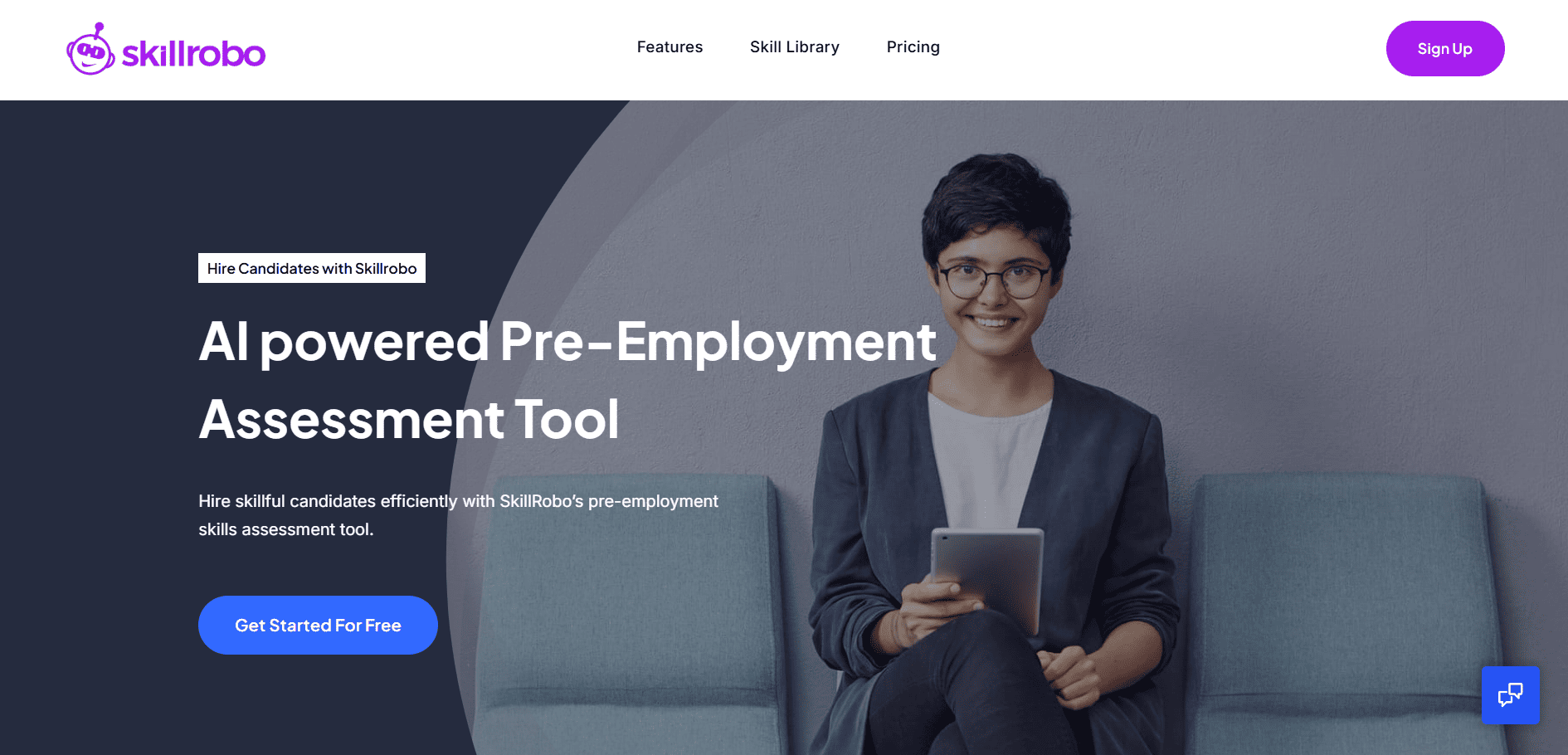
Skillrobo is a robust skills assessment tool that empowers hiring teams to evaluate candidates through highly customizable pre-employment assessments. Whether you’re hiring for IT, marketing, finance, or customer service roles, Skillrobo allows you to design job-specific evaluations with precision. The platform supports role-based test creation, anti-cheating features, and detailed analytics, helping you make confident hiring decisions. With a focus on usability and scalability, Skillrobo simplifies both high-volume and niche hiring without compromising assessment quality.
One of Skillrobo’s standout capabilities is its ability to offer custom skill assessments that reflect real-world scenarios. For instance, recruiters can assess communication, cognitive reasoning, or domain-specific knowledge using tailored question formats. Plus, Skillrobo’s integration with ATS platforms ensures a seamless experience from test assignment to candidate onboarding.
Best for: Organizations looking for customizable, role-based assessments across technical and non-technical job functions.
Key Features:
- Custom test builder with support for multiple question types and job roles
- AI-powered proctoring and anti-cheating tools like browser lock and webcam monitoring
- Real-time analytics and ATS integration for streamlined hiring workflows
Skillrobo’s solutions are also ideal for enterprises seeking online skills assessments that align with business goals and reduce hiring time.
2. Bryq
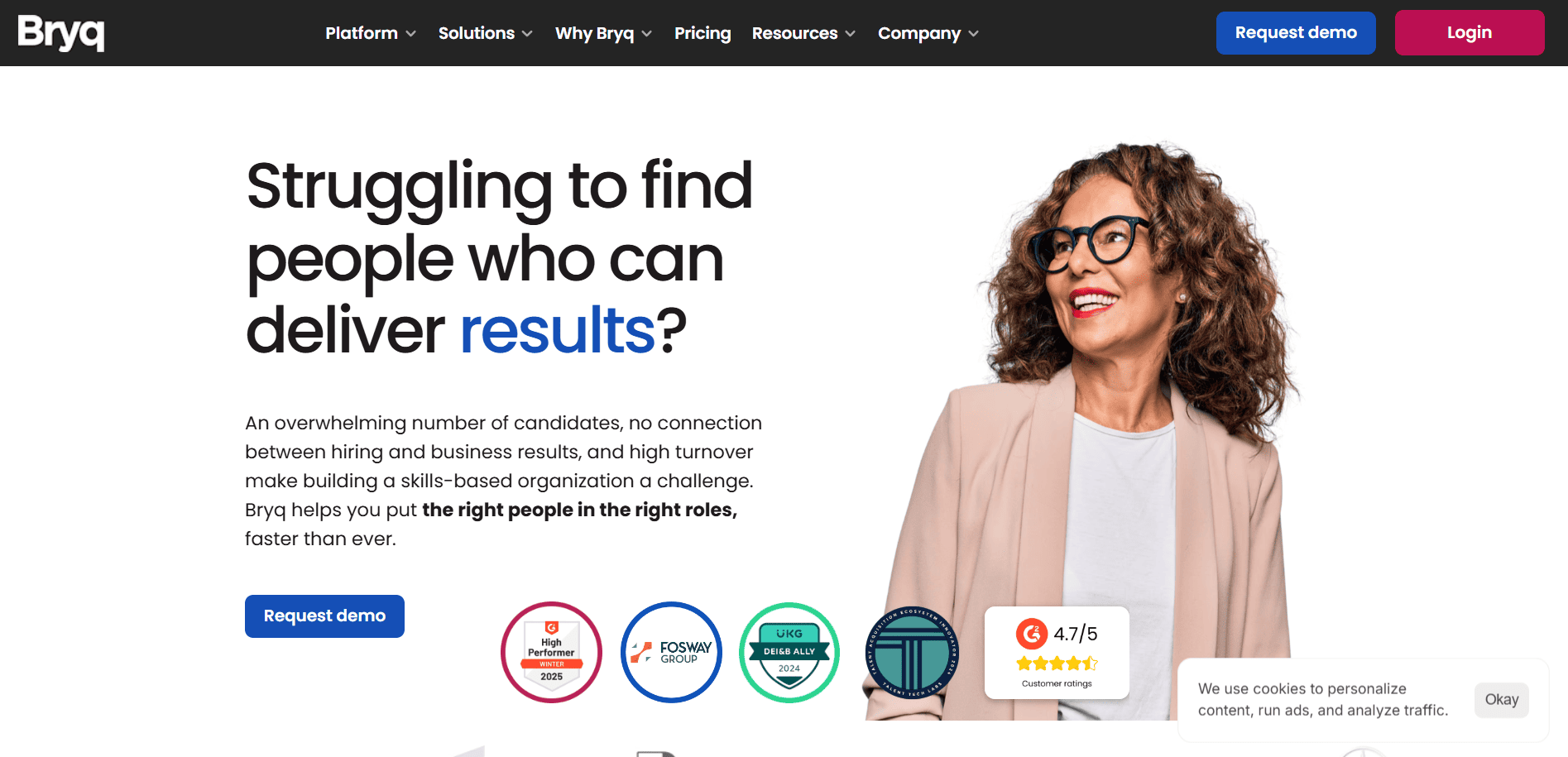
Source: Bryq
Bryq is a science-backed skills assessment platform that blends cognitive testing with personality analysis to determine candidate-job fit. Instead of evaluating resumes alone, Bryq helps employers measure a candidate’s potential, adaptability, and alignment with company culture. Its results are easy to interpret and structured for unbiased hiring.
Best for: Matching candidates to company values, team dynamics, and long-term potential.
Key Features:
- Cognitive and personality trait mapping with science-based methodology
- Bias-free candidate shortlisting for inclusive hiring
- Predictive job-fit reporting for long-term retention
3. Clevry
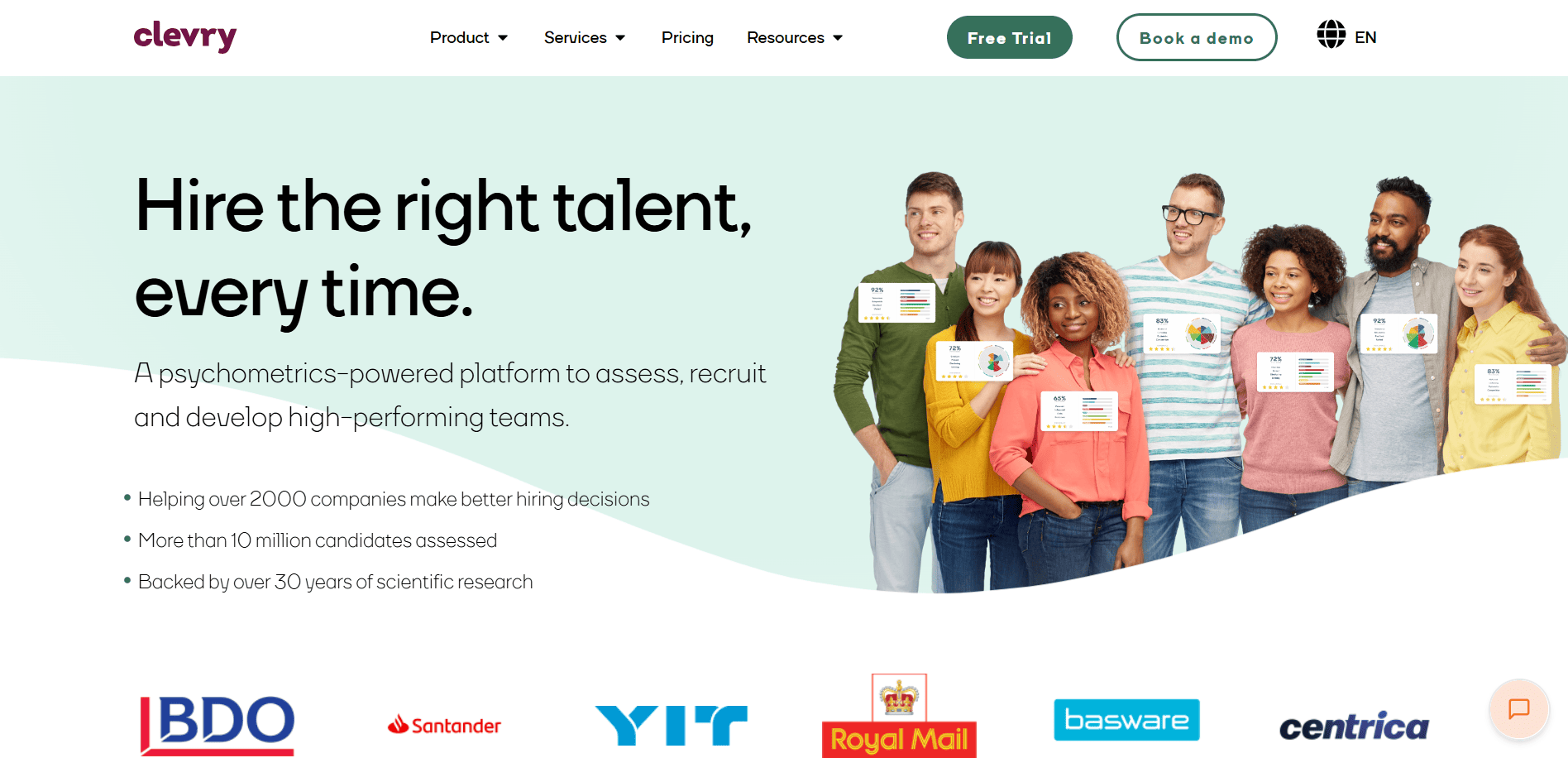
Source: Clevry
Clevry focuses on soft skills, helping hiring managers evaluate interpersonal behavior, emotional intelligence, and motivation. It’s especially useful for roles that require collaboration, communication, and leadership. By using psychometric profiling and situational judgment tests, Clevry adds a deeper layer of insight into candidate suitability.
Best for: Soft skills assessments and cultural alignment.
Key Features:
- Personality questionnaires and motivation diagnostics
- Situational judgment tests for real-world insight
- Psychometric profiling with team-fit analysis
4. Harver

Source: Harver
Harver is a high-volume skills testing software tailored for enterprise hiring needs. It enables HR teams to assess candidates across language, cognitive, and personality metrics—all within a customizable workflow. Harver’s real-time dashboards and integrations make it scalable and efficient for mass recruitment.
Best for: Efficient large-scale recruitment with structured assessments.
Key Features:
- Scalable assessment flows with multilingual support
- Real-time dashboards for analytics and tracking
- Seamless ATS integration and automation options
5. MeritTrac
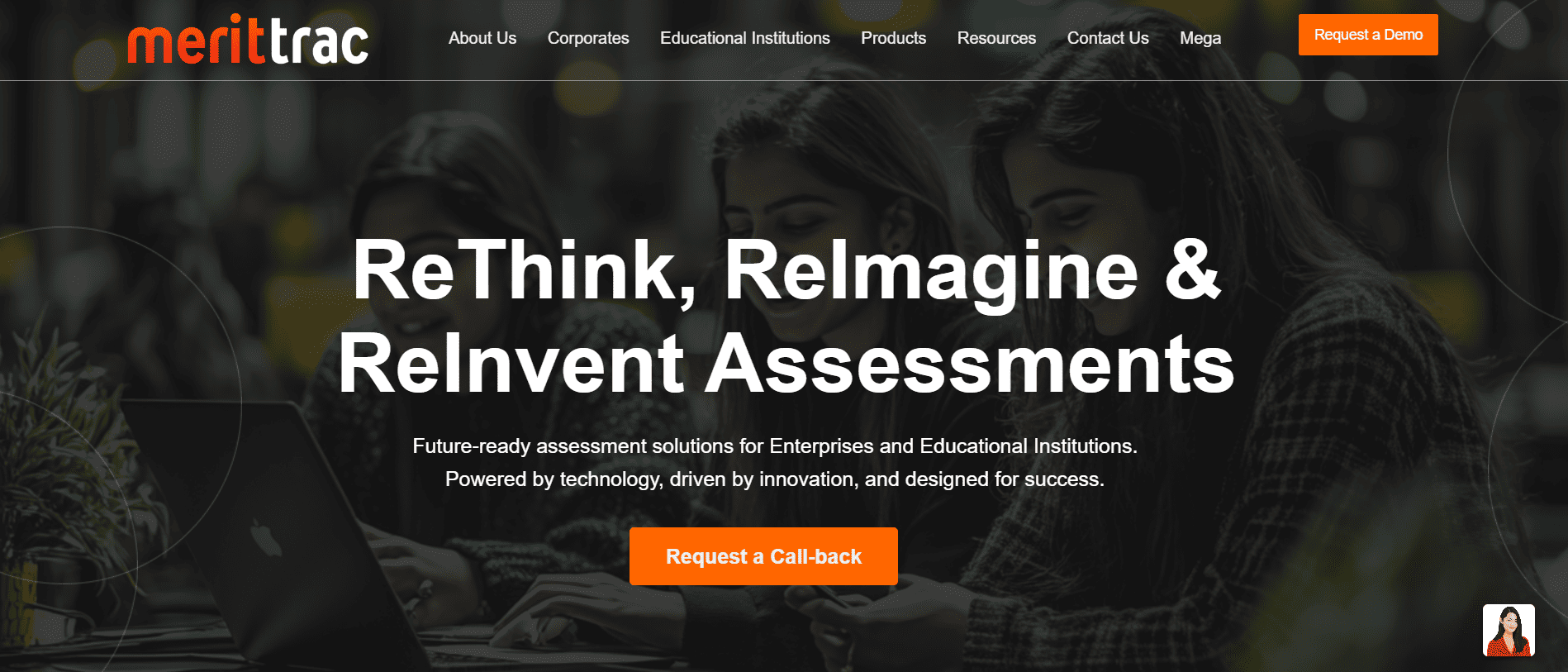
Source: MeritTrac
MeritTrac offers a wide range of assessments across technical, behavioral, and domain-specific skills. Known for its secure testing environments and remote proctoring tools, it’s a great solution for distributed teams and global hiring initiatives. The platform supports various industries, including IT, BFSI, and manufacturing.
Best for: Secure, large-scale assessments across multiple industry verticals.
Key Features:
- Remote proctoring and test integrity features
- Large question libraries for different domains
- In-depth candidate performance analytics and benchmarking
6. Owiwi
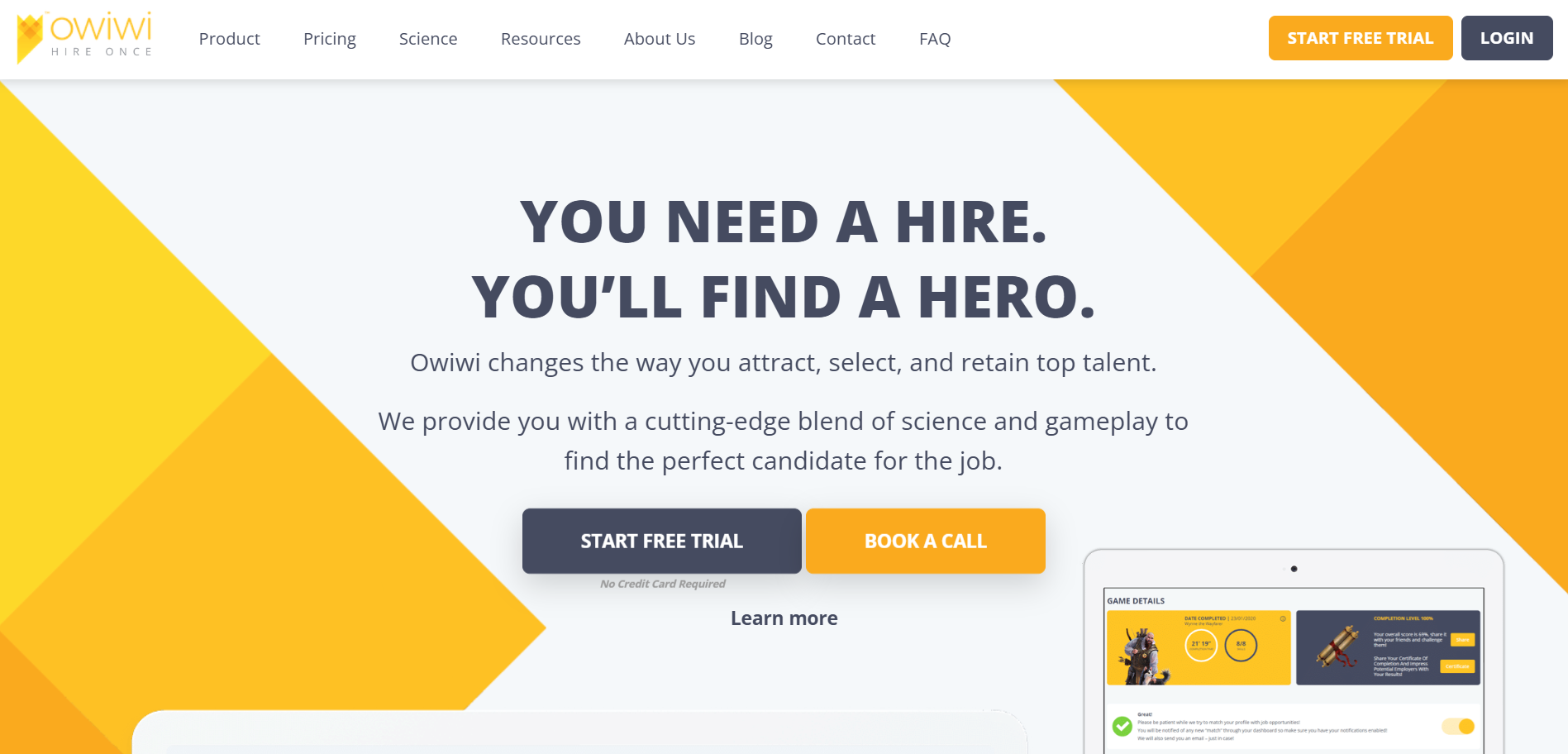
Source: Owiwi
Owiwi turns assessments into an interactive experience by gamifying the process. Candidates navigate through engaging storylines while their behavior and decisions are evaluated against key soft skills like adaptability, leadership, and conflict resolution. This method not only enhances candidate experience but also improves the quality of behavioral insights.
Best for: Gamified soft skills assessments to boost candidate engagement.
Key Features:
- Game-based simulations for behavioral evaluation
- Cultural fit and personality trait mapping
- An engaging candidate journey that improves test completion rates
7. AssessFirst
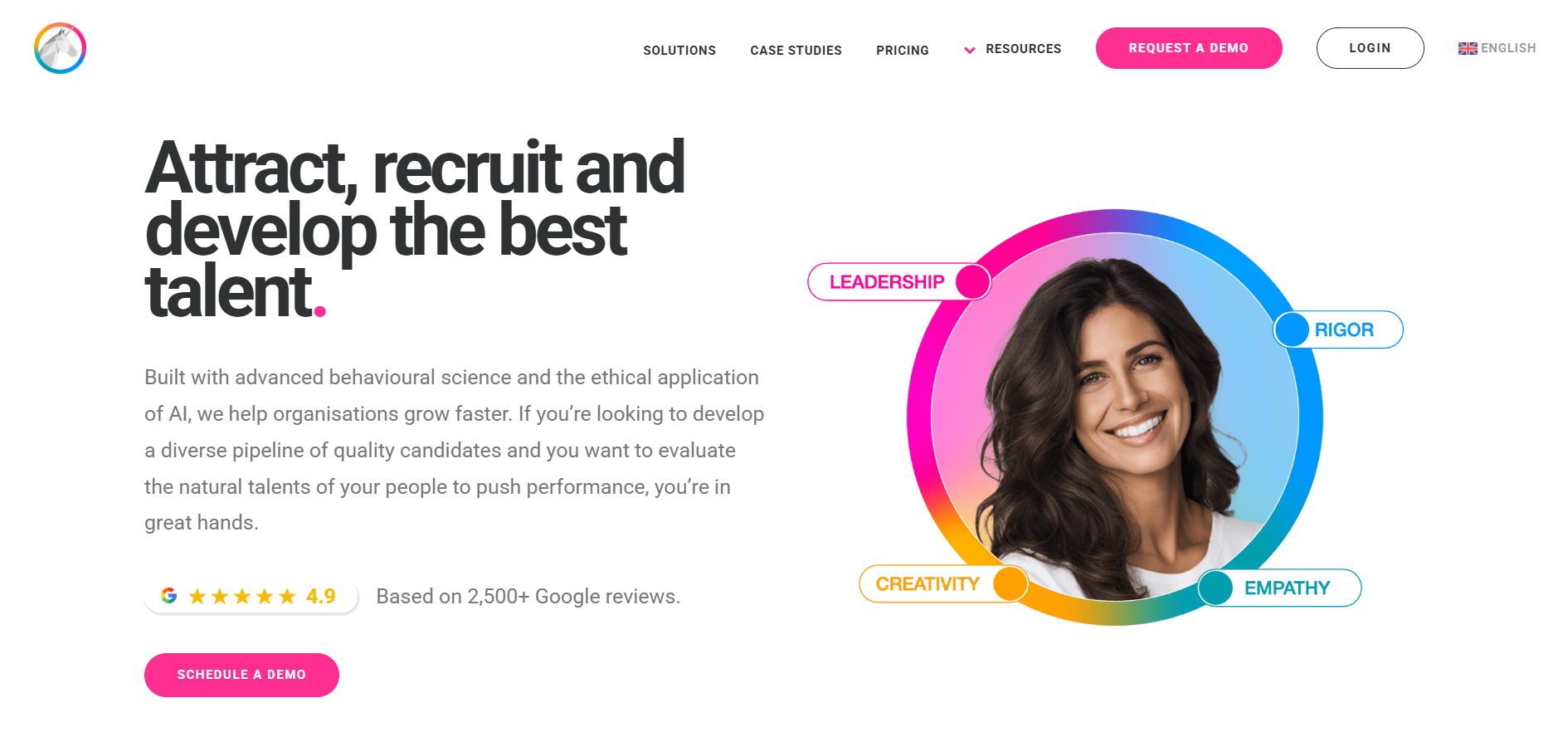
Source: Assessfirst
AssessFirst offers predictive hiring through personality, motivation, and cognitive assessments. Built around behavioral science, it helps companies understand how candidates are likely to behave and perform in real work situations. AssessFirst is widely used to support diversity and inclusion in hiring through its bias-free assessment framework.
Best for: Behavioral science-based predictions for team and role alignment.
Key Features:
- Personality and motivation analysis to forecast job behavior
- AI-driven hiring recommendations for culture and team fit
- Visual dashboards to compare applicants across multiple traits
8. ThriveMap
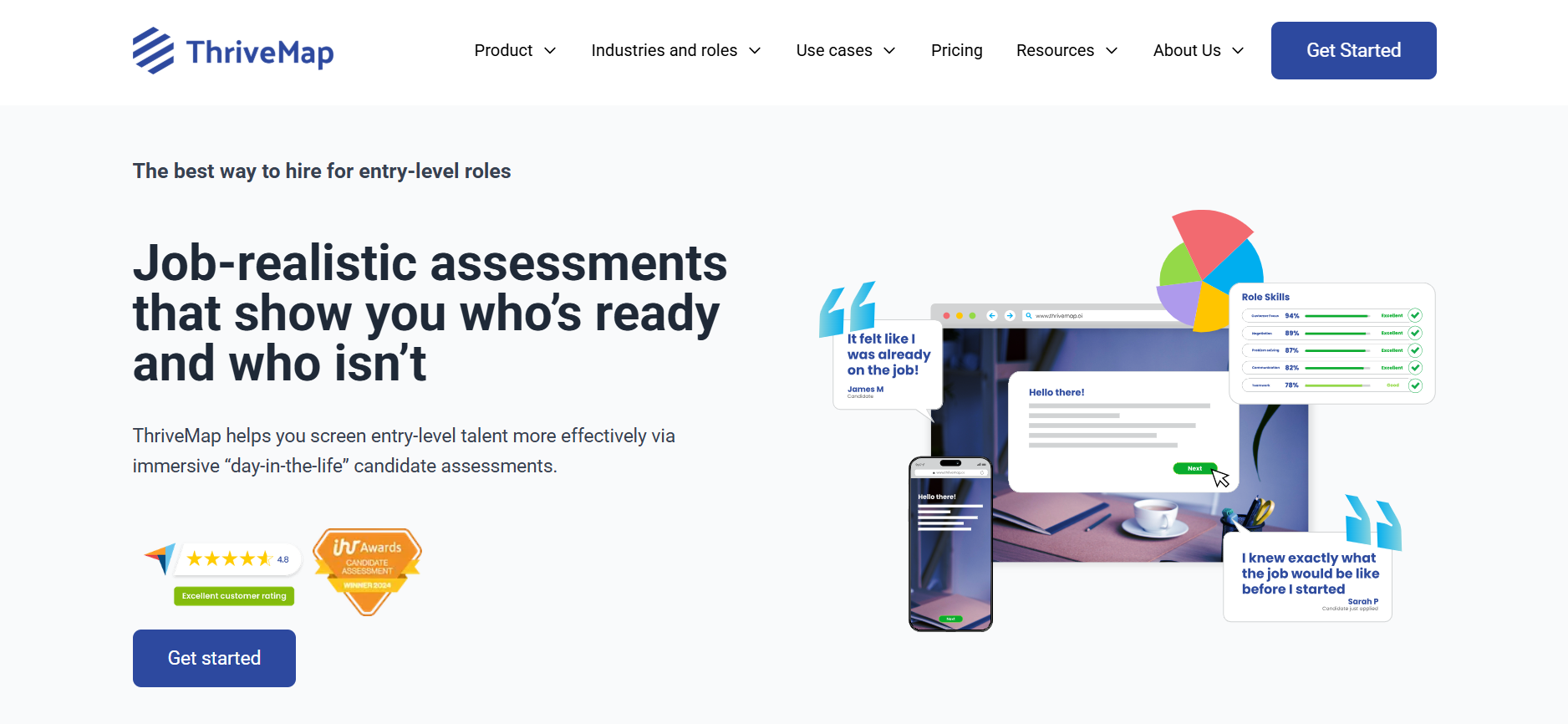
Source: ThriveMap
ThriveMap creates realistic job assessments that simulate what a typical day looks like in a role. These assessments not only evaluate candidates’ practical skills but also set expectations clearly, which reduces early attrition and improves job satisfaction. The tool is particularly useful in high-turnover sectors like customer support and retail.
Best for: Job previews that improve retention and expectation alignment.
Key Features:
- Real-world workflow simulations customized for each role
- Candidate experience mapping to screen for job-readiness
- Predictive analytics for turnover risk and job match
9. Kandio
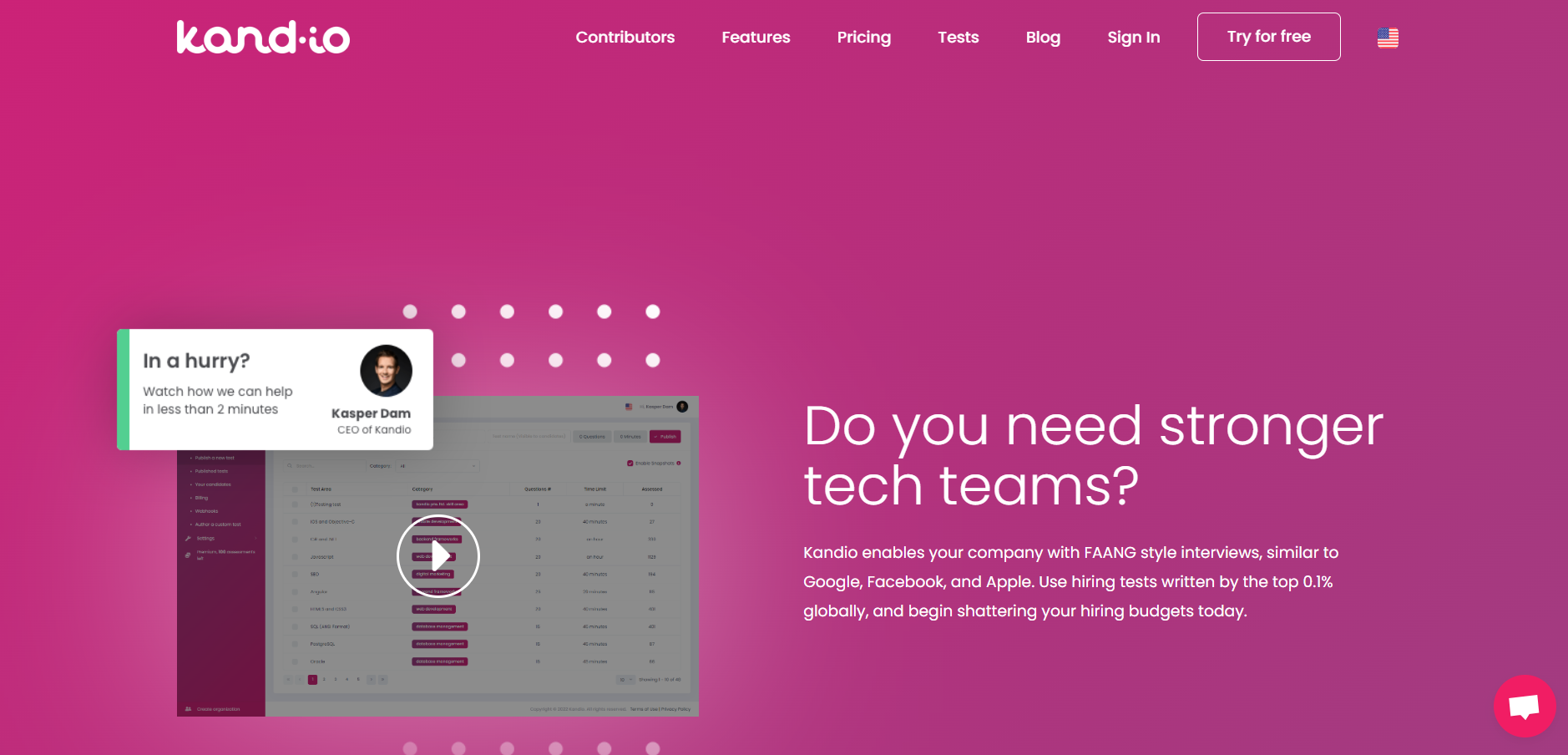
Source: Kandio
Kandio is a lightweight yet powerful skills assessment platform tailored for startups and lean hiring teams. It provides ready-to-use assessments crafted by subject matter experts in areas like programming, UI/UX design, digital marketing, and finance. These pre-built tests can be embedded directly into job applications or shared via email, allowing recruiters to screen candidates quickly without needing to build tests from scratch. Kandio is ideal for companies that want quality evaluations without dedicating internal resources to test design.
Best for: Curated test libraries for startups and small teams.
Key Features:
- Expert-authored assessments across coding, marketing, design, and more
- Performance dashboards that benchmark candidate scores for objective evaluation
- Easy embedding into job boards, career pages, and email campaigns for frictionless screening
10. Testlify
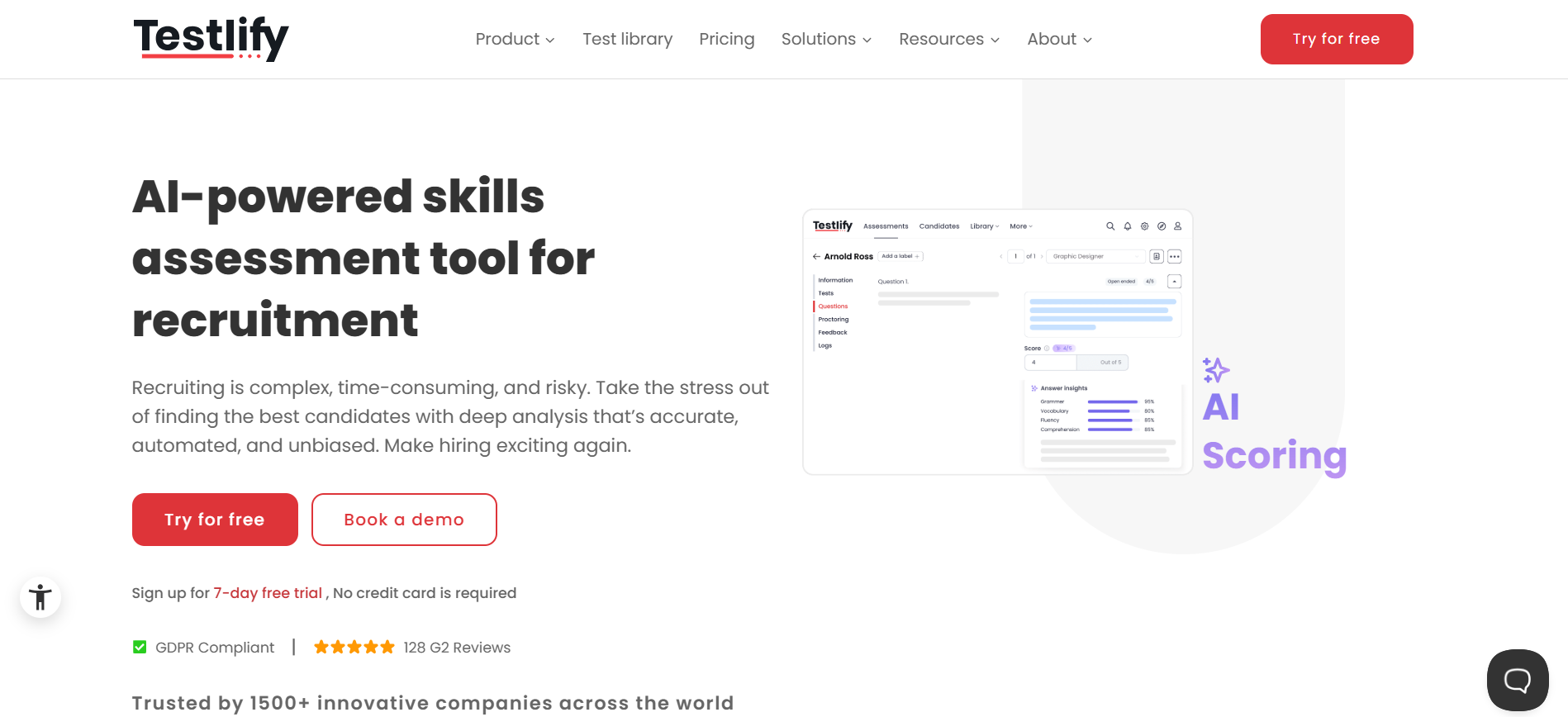
Source: Testlify
Testlify is an intuitive and scalable online skills assessment platform built to streamline high-volume hiring without sacrificing evaluation depth. It offers a wide range of ready-to-use tests across categories like aptitude, programming, language proficiency, and more. With real-time scoring and automation, it helps recruiters shorten their hiring cycles and filter candidates quickly. Its user-friendly interface, mobile accessibility, and seamless ATS integration make it suitable for teams of any size.
Best for: Rapid screening and high-volume candidate evaluation.
Key Features:
- A diverse question bank covering aptitude, language, technical, and behavioral skills
- Real-time scoring, detailed reports, and comparative analytics for better decision-making
- Mobile-compatible assessments with full ATS and workflow integration
11. Adaface
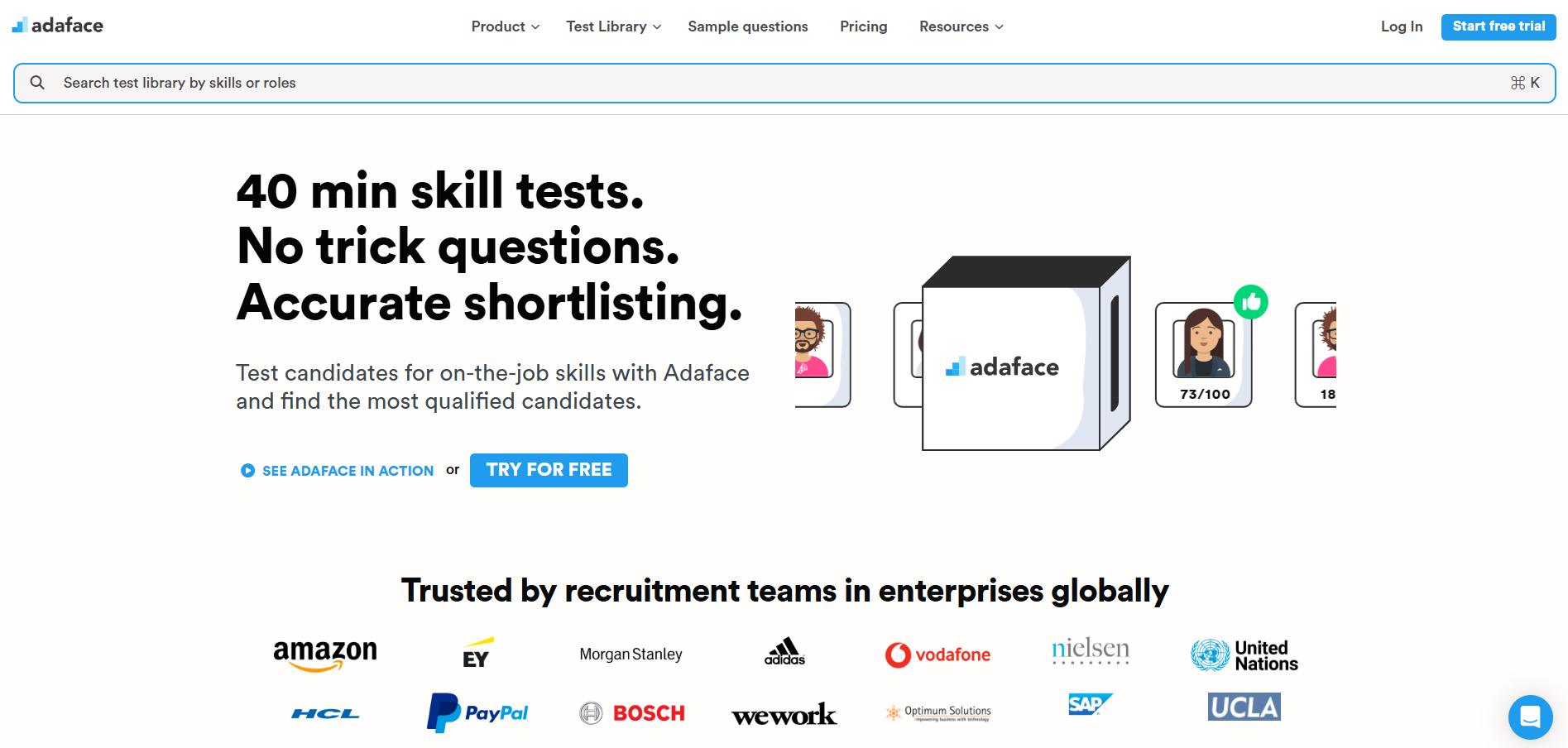
Source: Adaface
Adaface reimagines candidate testing by replacing standard tests with conversational assessments. Instead of lengthy quizzes, candidates interact with a friendly chatbot that simulates real work scenarios and challenges. This not only keeps candidates engaged but also produces accurate assessments of their skills and logical thinking. Ideal for engineering and digital roles, Adaface also emphasizes integrity with built-in anti-plagiarism mechanisms and customizable question sets.
Best for: Conversational assessments for technical roles.
Key features:
- Conversational chatbot interface for personalized assessment.
- Coding environments with auto-grading, time-tracking, and plagiarism control
- Detailed performance reports with skill-wise analytics and scoring
12. WeCP (We Create Problems)
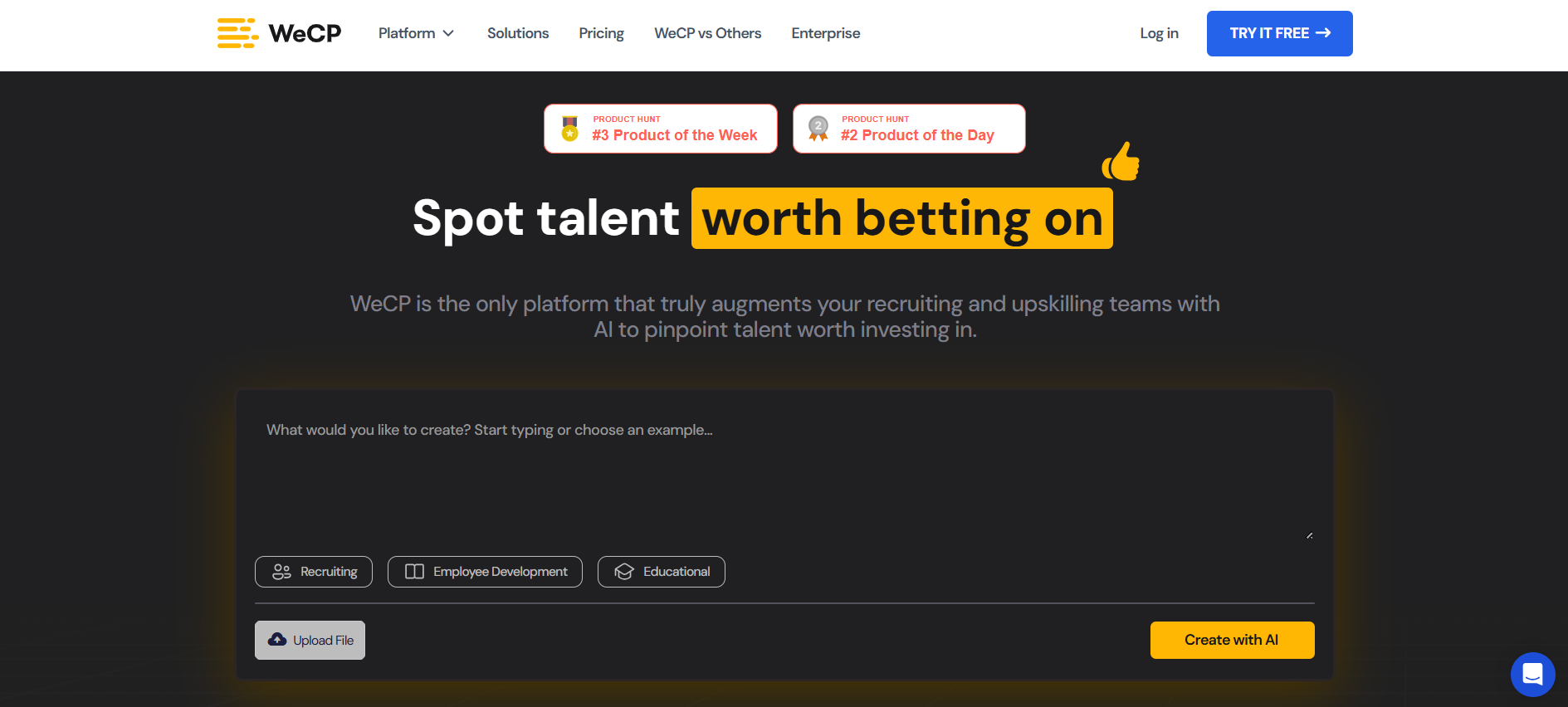
Source: WeCP
WeCP is a developer-focused skills assessment tool used to evaluate programming, database, and design skills. It helps recruiters build job-specific tests that simulate real-world problems engineers would encounter. The platform stands out for its ability to create timed, secure, and highly tailored coding challenges. Recruiters looking to assess backend, frontend, or full-stack developers use WeCP to test practical skills, not just theory.
Best for: Deep technical assessments for engineering roles.
Key Features:
- Hands-on coding simulations reflecting actual job responsibilities
- Anti-cheating tools, including tab-switch detection, webcam monitoring, and time controls
- Skill benchmarking and comparative analytics for easy shortlisting
13. Xobin
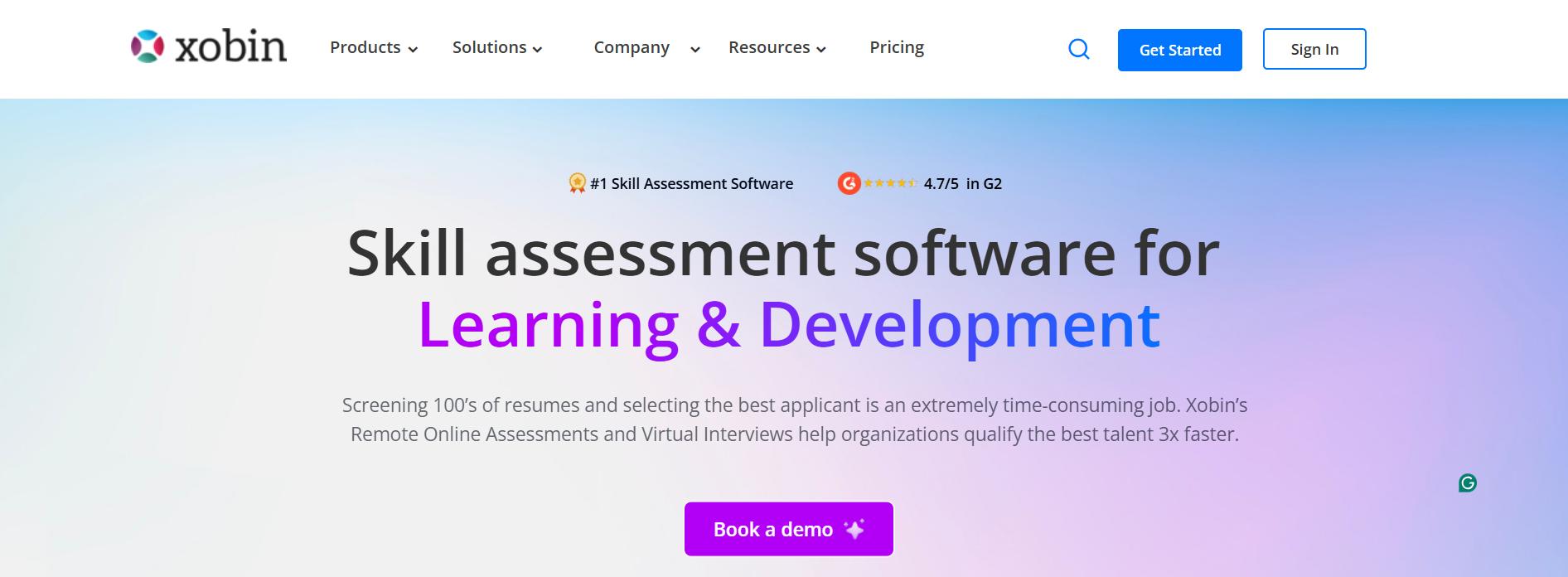
Source: Xobin
Xobin provides an end-to-end skills testing software platform that includes everything from psychometric assessments and coding tests to AI-evaluated video interviews. It’s a go-to solution for growing companies that want to centralize and automate their candidate evaluation workflows. The platform also supports scenario-based testing and role-specific assessments, making it suitable for technical and non-technical roles alike. With Xobin, recruiters can streamline hiring, reduce bias, and ensure faster decision-making.
Best for: All-in-one assessment and interview automation.
Key Features:
- AI-enabled video interviews, with facial and speech analysis for added insights
- Role-based assessment libraries, including coding, cognitive, and behavioral tests
- Real-time dashboards to compare candidates and collaborate across teams
14. CodeSignal
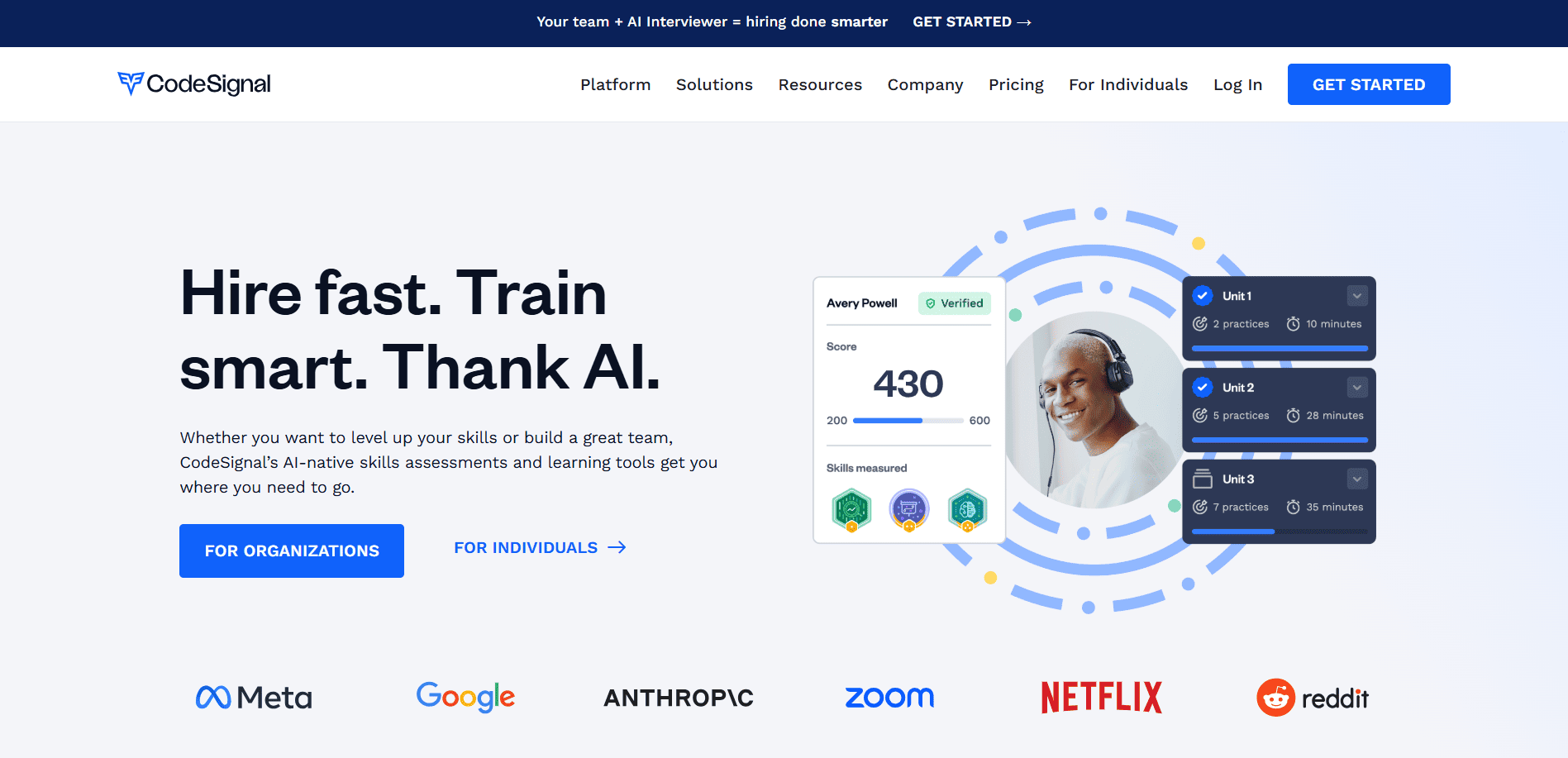
Source: CodeSignal
CodeSignal is a well-known skills testing platform for technical recruiting. Its signature offering—an IDE-like coding environment—enables employers to assess developers using real-world coding challenges and receive standardized scores. These scores are benchmarked across industry datasets, ensuring fairness and objectivity. Trusted by engineering teams, CodeSignal helps assess both early-career and experienced developers at scale. Its comprehensive integrity features ensure candidate authenticity even during remote evaluations.
Best for: Standardized coding assessments for high-quality technical hiring.
Key Features:
- Industry-standard CodeScore for comparing coding ability objectively
- Proctoring tools like live monitoring and secure browsers to prevent fraud
- Real-time feedback and simulated project-based challenges
15. Glider AI

Source: Glider
Glider AI is an AI-powered skills assessment and talent intelligence platform that offers coding simulations, video interviews, and role-specific tests for a wide range of functions, including sales, support, and tech. It’s designed for companies that need to evaluate both skill and authenticity, especially in remote hiring contexts. Glider AI also supports asynchronous interviews, live coding tests, and behavioral evaluations, all enriched with proctoring tools that ensure candidate credibility. It integrates easily with applicant tracking systems and supports enterprise-level hiring workflows.
Best for: AI-assisted hiring workflows with secure assessment environments.
Key Features:
- Skill-based simulation tests tailored to each job function
- AI-evaluated video interviews with smart question sequencing
- Advanced fraud detection tools, including browser lockdown and ID validation
16. HireVue
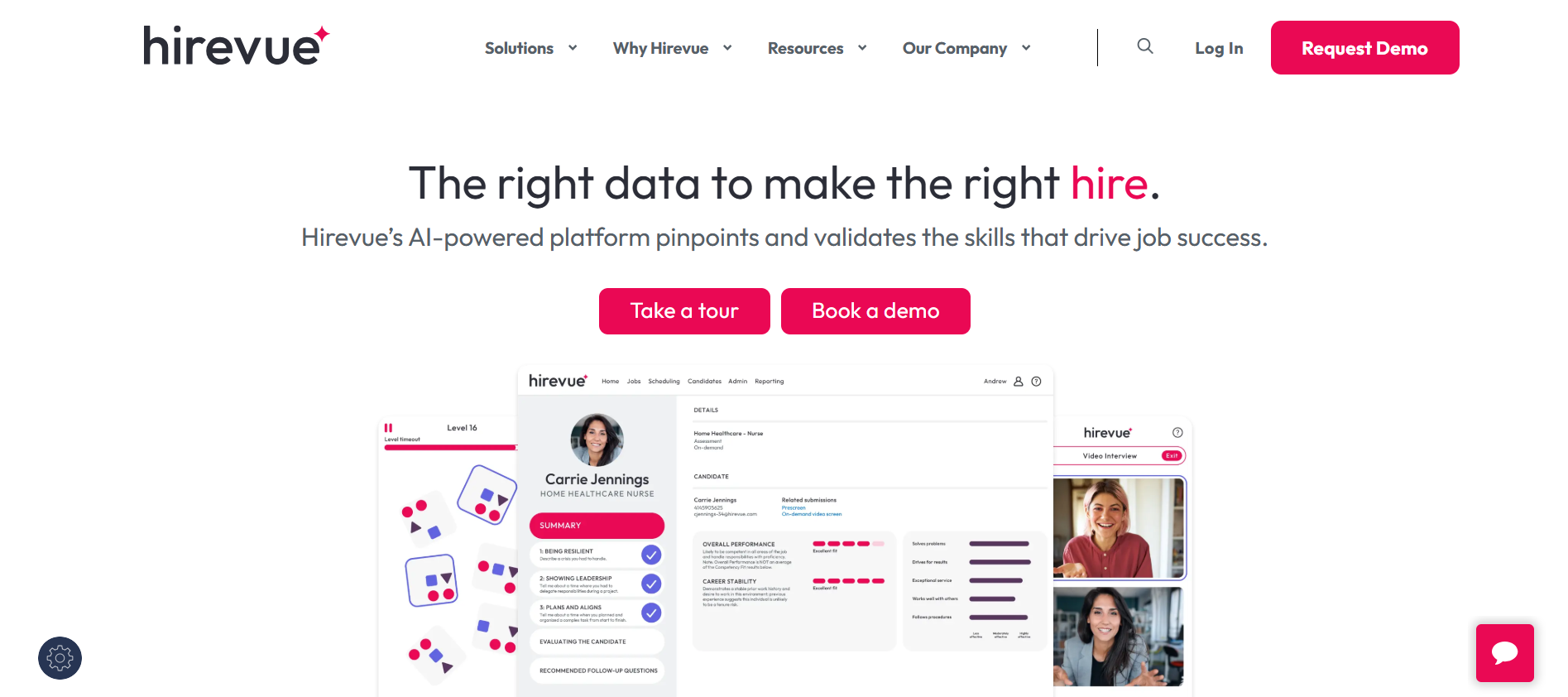
Source: HireVue
HireVue blends structured video interviewing with AI-driven assessments to evaluate candidates’ soft skills, communication style, and job readiness. Its platform uses behavioral science and predictive analytics to identify high-potential candidates, making it a great fit for roles where presentation and emotional intelligence matter.
Best for: Video-based evaluations with soft skills analysis.
Key Features:
- On-demand video interviews with automated scoring
- AI analysis of verbal and non-verbal communication cues
- Seamless ATS and calendar integration for smooth scheduling
17. Talview
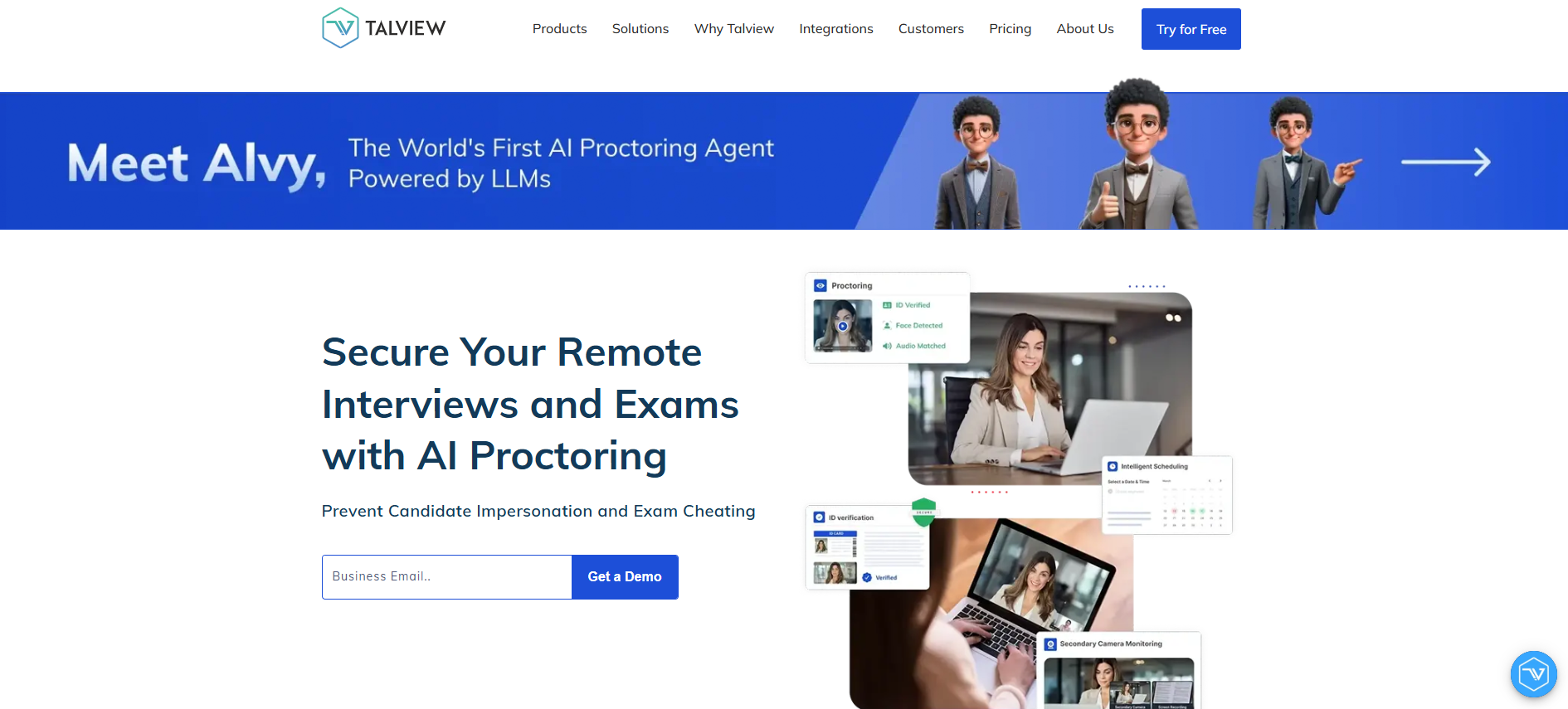
Source: Talview
Talview is an end-to-end assessment and remote hiring platform that combines cognitive testing, video interviews, and behavioral assessments. It’s particularly useful for enterprises hiring across multiple locations or managing virtual recruitment drives.
Best for: Virtual hiring with cognitive and behavioral assessments.
Key Features:
- Remote proctoring with AI surveillance
- Cognitive and behavioral test modules
- Integration with leading ATS and LMS platforms
18. HighMatch
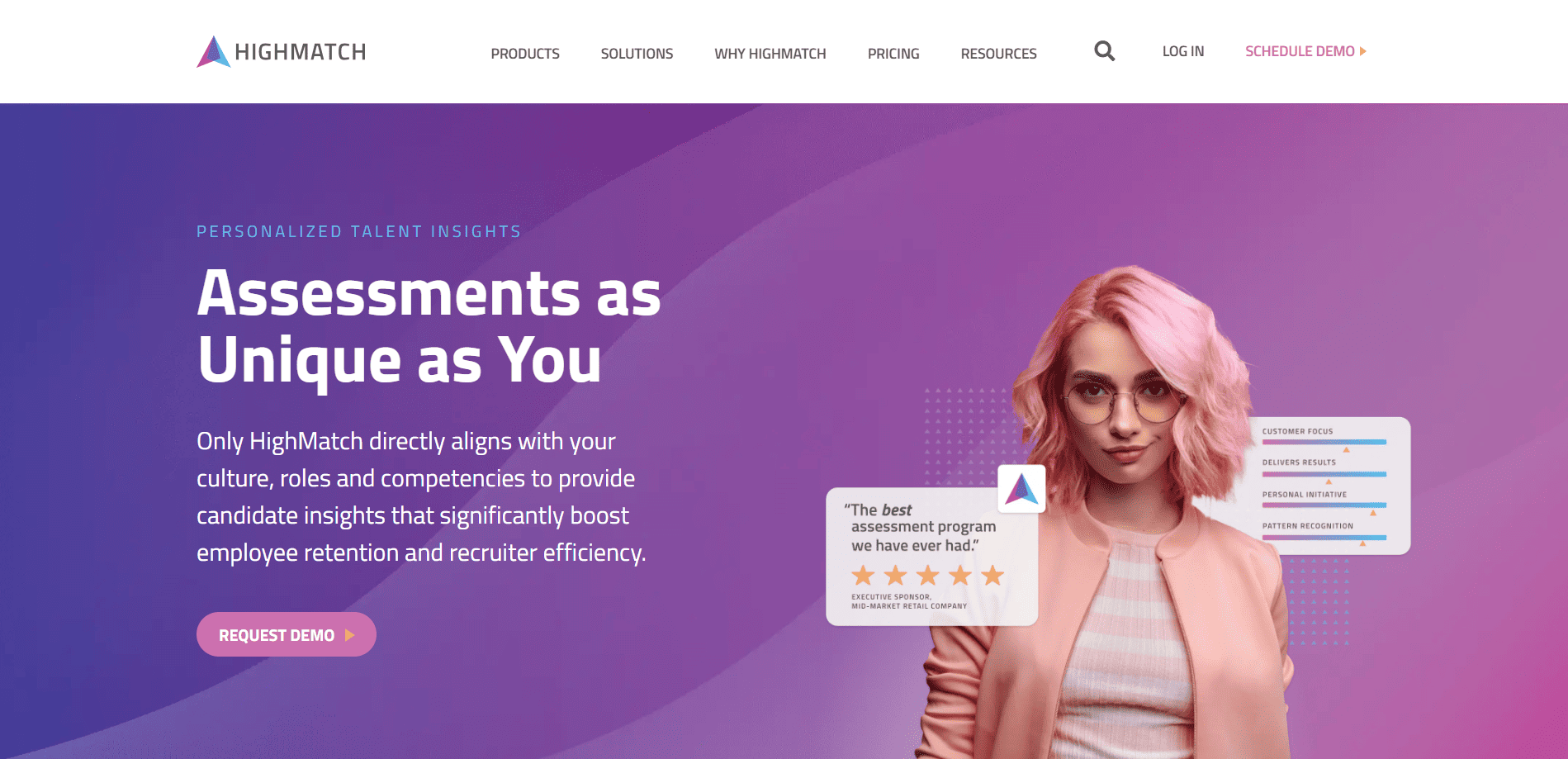
Source: HighMatch
HighMatch offers customized pre-employment testing built around an organization’s unique job roles and culture. Formerly known as Berke Assessment, the platform helps teams evaluate traits like problem-solving, logic, and personality to ensure better hiring decisions.
Best for: Tailored assessments aligned to company culture.
Key Features:
- Custom test creation with input from industrial-organizational psychologists
- Easy-to-read candidate fit scores and reports
- Fast implementation without tech overhead
19. HR Avatar
![]()
Source: HR Avatar
HR Avatar provides simulation-based pre-employment tests that evaluate both cognitive and job-specific skills. Candidates complete realistic tasks such as handling emails, navigating systems, or solving job-related problems, which gives employers a fuller picture of performance.
Best for: Simulation-style evaluations for job realism.
Key Features:
- Role-based simulations with animated scenarios
- Tests for both soft skills and job knowledge
- Built-in video response recording and scoring
20. EmployTest
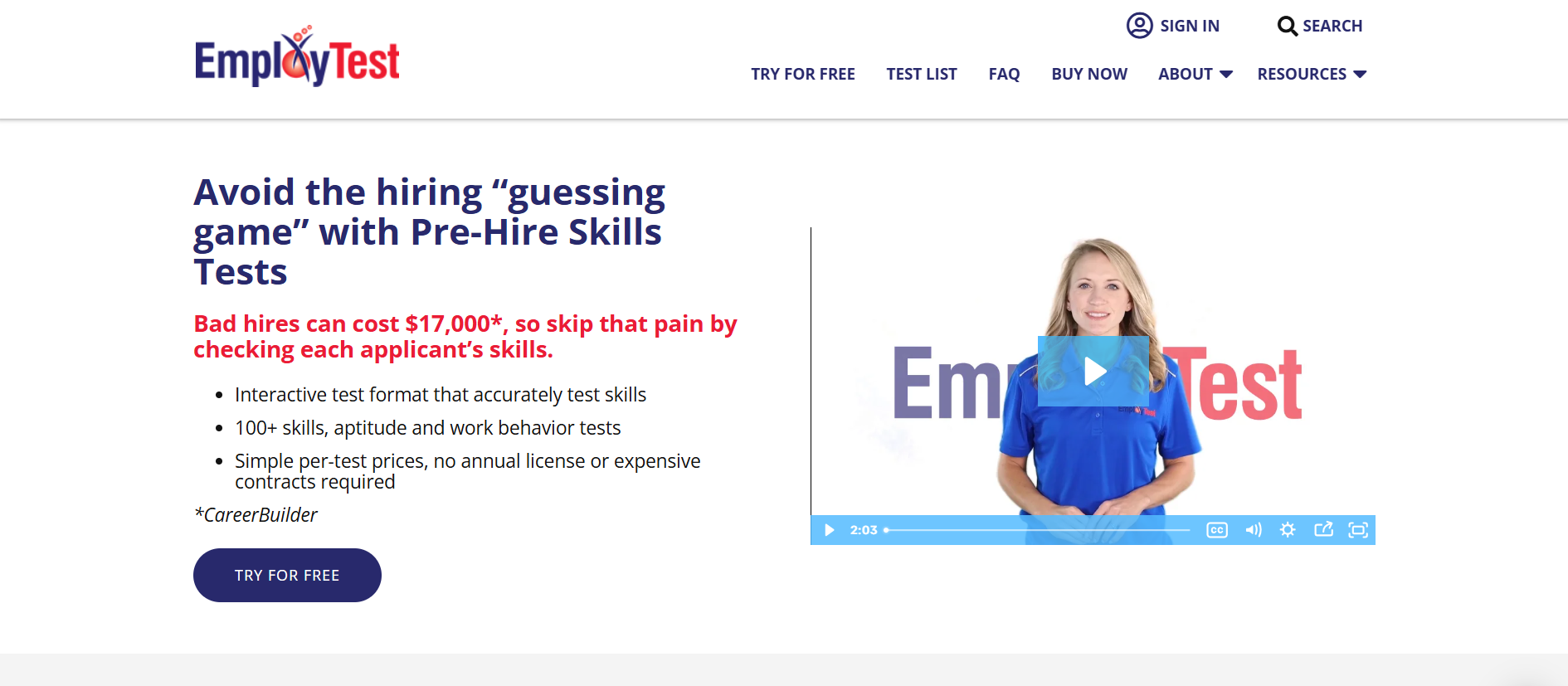
Source: EmployTest
EmployTest delivers online skills assessments focused on clerical, customer service, accounting, and general office roles. It’s designed to help employers reduce bad hires by screening for attention to detail, software knowledge, and communication ability.
Best for: Office roles and administrative skill screening.
Key Features:
- Microsoft Office, accounting, and data entry tests
- Cognitive ability and personality profiling
- Quick deployment with easy-to-read score reports
Why Skillrobo is the Best Skills Assessment Tool
Skillrobo stands out as the most versatile and business-friendly skills assessment platform for organizations aiming to hire with precision. Unlike generic testing tools, Skillrobo offers role-based assessments that are fully customizable and aligned with real job requirements, whether you’re hiring for sales, tech, finance, or customer support. Its AI-powered proctoring, detailed performance analytics, and intuitive interface ensure both assessment integrity and ease of use for recruiters and candidates.
Skillrobo also integrates smoothly with applicant tracking systems, helping HR teams manage high volumes of applicants without manual effort. From small businesses to enterprise hiring, it offers the flexibility to scale your assessment strategy efficiently.
What truly sets Skillrobo apart is its focus on candidate experience, bias-free scoring, and data-driven hiring decisions. It empowers recruiters to move beyond resumes and interviews and into evidence-backed hiring, ensuring only the most capable candidates move forward.
Choose Skillrobo for Confident, Skills-Based Hiring
Hiring the right candidate isn’t about assumptions—it’s about verified skills. With Skillrobo’s skills assessment software, recruiters can eliminate guesswork and streamline decisions using role-specific, data-driven evaluations.
Whether you’re testing for coding skills, cognitive aptitude, communication, or leadership traits, Skillrobo provides everything you need in one secure, scalable platform. It’s more than just a skills testing software—it’s your competitive edge in modern hiring.
Sign up for Skillrobo today to simplify your hiring process and build stronger teams with confidence.